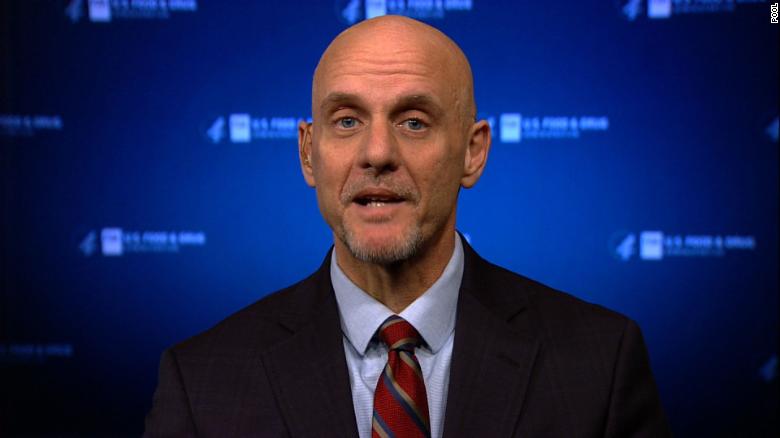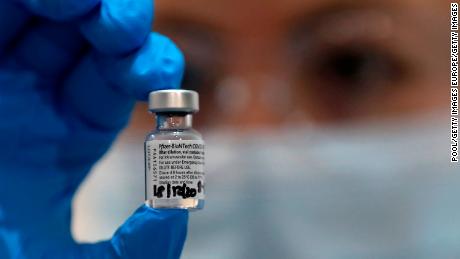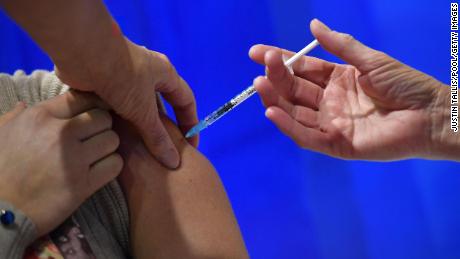(CNN)The very fast decision to grant emergency use authorization to the first coronavirus vaccine in the United States cut no corners and was based on a deep review of safety and efficacy data, two top US Food and Drug Administration officials said Saturday.
The FDA granted the EUA -- the first ever for a vaccine for use in the general public in the United States -- late Friday, just a day after advisers recommended it.
The FDA has been pummeled by a White House clamoring for a fast win and caught between public forces desperate for something -- anything -- to help fight a pandemic that has killed close to 300,000 Americans, but also deeply suspicious of new scientific technology developed in a highly charged political atmosphere.
FDA Commissioner Dr. Stephen Hahn said his agency's scientists, considered the best in the world, stayed above the upheaval as they reviewed the data about Pfizer and BioNTech's vaccine.
"Science and data guided the FDA's decision," Hahn told a Saturday morning news conference carried by webcast and broadcast over social media.
The FDA listened to the advice of its Vaccines and Related Biological Products Advisory Committee (VRBPAC), a group of experts with no financial ties to the vaccine process, who voted 17-4 with one abstention to recommend EUA of the vaccine after two public meetings.
"We held a public advisory committee on Thursday about the Pfizer and BioNTech application," Hahn said. "The committee overwhelmingly agreed that the vaccine's benefits outweighs its risks."
Hahn said the FDA has been transparent about the data.
"We've also posted important information to help health care providers understand the benefits, risks and proper use of this FDA authorized vaccine," said Hahn.
EUA is a process that's quicker than full approval -- something that can take months or even years for a vaccine. But Dr. Peter Marks, who heads FDA's vaccine division, the Center for Biologics Evaluation and Research, said repeatedly the EUA standard would only be slightly short of what would be required for full licensure.
Hahn said the FDA reviewed not just Pfizer and BioNTech's summary of their clinical trial involving around 40,000 volunteers, but went through to original source data. It showed the vaccine was safe and provided 95% protection. "Our incredible team, heroic efforts, night and day worked to get this out the door," Hahn said.
"As Dr. Marks said, thousands of people are dying a day."
And Hahn said he was aware that many Americans may be nervous about getting the vaccine.
"The agency is very concerned about vaccine hesitancy," Hahn said.
"We are also aware that some feel that the speed with which this development and then regulatory process took place might give them concerns about the vaccine," he added.
The FDA has addressed the hesitancy, Hahn said, by being transparent about the science behind Pfizer and BioNTech's Covid-19 vaccine and the process for authorizing it.
"We believe that that transparency, as well as the rigorous scientific review that we've done, goes a long way to providing confidence and trust in the American people and FDA and this vaccine," he said.
The FDA also conferred with health regulators in Britain, which rolled out the vaccine ahead of the US.
After two people who got the vaccine in Britain experienced allergic reactions, the FDA added warning language to the vaccine's label that cautions about the possibility. Hahn said the FDA and US Centers for Disease Control and Prevention would make sure that emergency supplies would be on hand at all vaccination sites to handle any allergic reactions.
And the FDA promises to closely follow safety data as million of Americans receive the vaccine.
"While this year has been marked by tragedy, sadness and sacrifice, it is also a year that has generated unparalleled scientific achievement that will resonate for many future generations," Hahn said.
Hahn also answered questions about political pressure. As the FDA made its decision, President Donald Trump took to Twitter to criticize what he saw as the agency's slowness. White House chief of staff Mark Meadows told Hahn he needed to grant the EUA by the end of the day Friday, and if not, he would have to resign, an administration official and a source familiar with the situation told CNN.
FDA's EUA came on Friday evening.
"First of all the representations in the press that I was threatened to be fired if we didn't get it done by a certain date is inaccurate," Hahn said.
"Dr. Marks and I have been very clear from the beginning that we are going to maintain the integrity of the scientific process. We are going to let our scientists do their job and review and go through the fairness of that review, the gold standard if you will," Hahn added.
"But we also recognize the urgency of the situation and so we have said repeatedly we will work as quickly as we can to come to a decision and that's what we did. Our team, the scientists, met after the VRBPAC meeting. They did come to the conclusion that the vaccine did meet our standard for effectiveness and safety. And as you know, before 7 a.m. on Friday, we issued a statement saying that we were working with the sponsor to move toward authorization."
More answers on new vaccine
Hahn and Marks answered other questions about the vaccine.
Pfizer's immunization is given as two doses, as is Moderna's, which comes up for VRBPAC consideration December 17.
While some of Pfizer's data indicated it might provide as such as 50% protection after a single dose, Marks said it would be "foolhardy" to consider granting permission to give just one dose -- even if that would stretch scarce supplies in a pandemic.
"The way the regimen was studied was that everyone, ultimately, or almost everyone received two doses of the vaccine, so we only know how people were protected with two doses of the vaccine," Marks said. "We spent so much time carefully reviewing the data and basing our decisions on science, right, that it seems pretty foolhardy to just conjecture that one dose might be OK without knowing," he added.
"So at least from the FDA perspective, we would be recommending that people complete the two-dose series so we actually know that they're truly protected at the rate of approximately 95% of efficacy."
Get CNN Health's weekly newsletter
Sign up here to get The Results Are In with Dr. Sanjay Gupta every Tuesday from the CNN Health team.
The FDA is also confident that, although the Pfizer vaccine is delicate, it can be safely distributed.
The Pfizer/BioNTech vaccine needs to be stored at about minus 75 degrees Celsius -- far colder than any vaccine currently used in the United States. The vaccines are using specially designed shippers with dry ice, and they can remain refrigerated for a few days once thawed.
FDA made clear in the labeling how the vaccine will need to be handled, Marks said, and the CDC and Operation Warp Speed "are making sure that things are in place to make sure that the cold chain is maintained."
"We're pretty convinced that we can, we can make this happen here," Marks said. "We've seen cold chains maintained in in locations that are pretty, pretty rural or pretty rough in, for instance, with vaccination campaigns in Africa. So we're hopeful that this is going to work out."
Several large hospital groups say they have bought special deep-cold freezers to store Pfizer vaccines.









